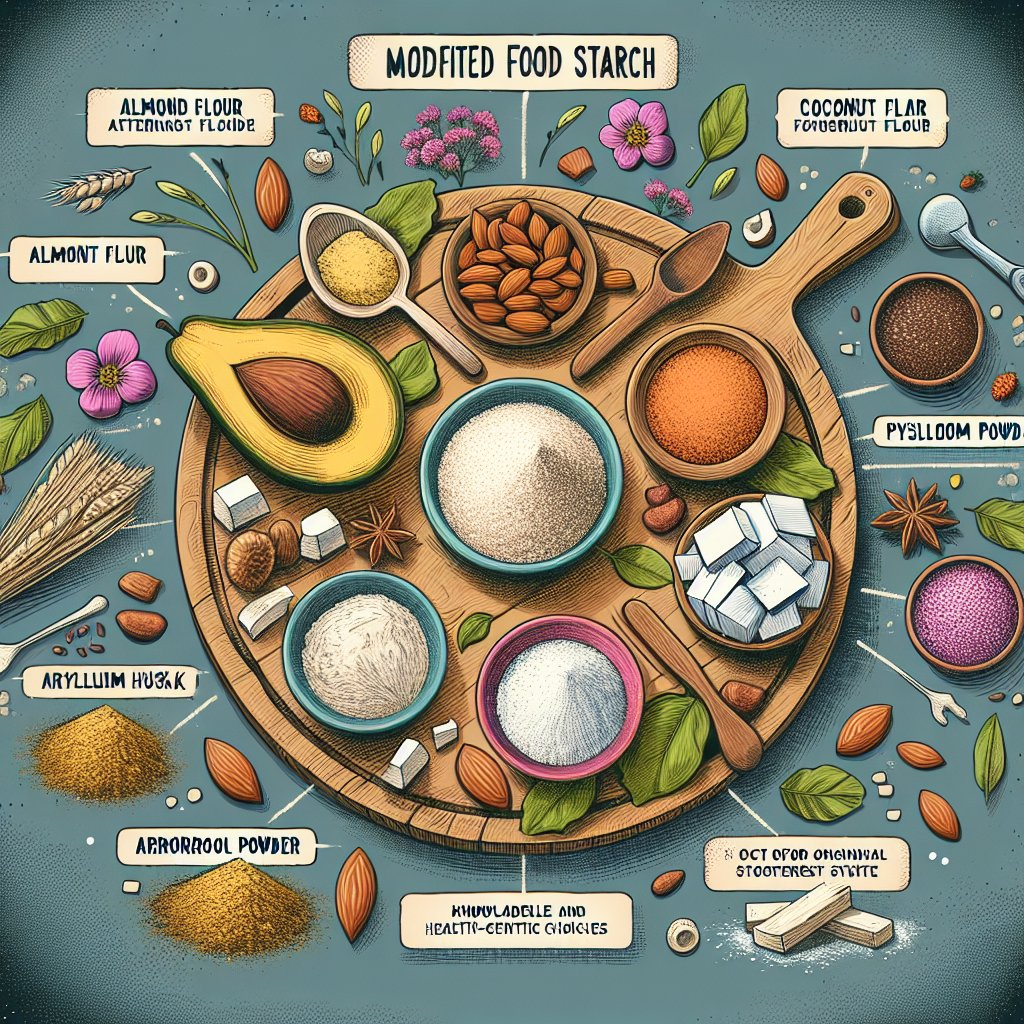Unlocking the Power of Modified Food Starch: Transforming Your Keto Diet
Unlocking the Power of Modified Food Starch: Transforming Your Keto Diet
Welcome to the ultimate guide on modified food starch and how it can revolutionize your keto diet! For those of you who are on a keto journey or are considering it, you might have heard about the term “modified food starch,” and today, we’re going to delve into what it is and how it can play a relevant role in your keto lifestyle.
So, what exactly is modified food starch? In simple terms, it’s a carbohydrate that has been treated to modify its properties. The modification process enhances its thickening and stabilizing properties, making it a versatile ingredient in many food products. When you’re on a keto diet, navigating through various food ingredients can be overwhelming, but understanding the role of modified food starch can be a game-changer in your culinary adventures.
Relevance in the Keto Diet
Modified food starch can be a valuable addition to your keto diet. It is commonly used as a low-carb thickening agent in keto-friendly products like soups, sauces, and salad dressings. The ketogenic diet emphasizes low-carbohydrate and high-fat intake, and modified food starch supports this requirement by providing a thickening solution without significantly impacting the carb count.
When selecting keto-friendly packaged products, it’s essential to read the labels diligently. Modified food starch not only offers a thickening element but also aligns with the principles of the keto diet. Incorporating food products containing modified food starch can provide you with a wider range of meal options, ensuring that your culinary experiences remain enjoyable and satisfying while staying in ketosis.
Understanding the role of modified food starch empowers you to make informed choices, elevating your keto journey to a whole new level of delicious and fulfilling possibilities. Let’s dive deeper into the benefits and practical uses of modified food starch, unlocking its potential to transform your keto diet experience.

What is Modified Food Starch?
If you’ve ever read the ingredients list on packaged foods, you’ve likely come across modified food starch. But what exactly is it? Modified food starch is a popular ingredient used as a thickening or stabilizing agent in a wide range of food products. It is derived from the processing of common starch sources such as corn, potatoes, wheat, or tapioca, and is commonly used in food production to improve texture, moisture retention, and shelf life.
Modified food starch is a versatile ingredient that can be found in a variety of products, including soups, sauces, dressings, and baked goods. It is known for its ability to enhance the overall sensory experience of food, making it more palatable, stable, and visually appealing.
When it comes to following a keto diet, it’s important to be mindful of the sources of modified food starch, as some may not align with the low-carb requirements of the ketogenic lifestyle. The key is to look for modified food starch derived from keto-friendly sources, such as corn or tapioca, while being cautious of variants sourced from higher-carb ingredients like wheat.
As you navigate the world of ketogenic eating, understanding the role of modified food starch and its sources can empower you to make informed choices and select products that support your nutritional goals.
Nutritional Value of Modified Food Starch
Modified food starch can be a valuable addition to a ketogenic diet due to its low carb content and versatility. Let’s dive into the nutritional composition of modified food starch.
Modified food starch is predominantly made up of carbohydrates, containing about 80-90% carbohydrates, depending on the source. However, the key point for keto dieters is that it’s low in net carbs, making it a suitable option for those following a low-carb lifestyle. Additionally, it’s important to note that modified food starch contains negligible fat and protein, which aligns well with the macronutrient profile of a ketogenic diet.
Despite being mainly carbohydrates, the modified food starch is often used in small quantities, which means the actual carb intake from it is relatively low. This can be beneficial for individuals looking to manage their carb intake while still enjoying a variety of food options.
When incorporating modified food starch into your keto diet, it’s essential to be mindful of serving sizes to stay within your daily carb limit. Always check the nutrition labels and aim for moderation to ensure it fits into your macros.

Impact of Modified Food Starch on Keto Diet
As we delve into the ketogenic diet, it’s important to understand the role of modified food starch within this lifestyle. Modified food starch can be a bit of a mystery for those following a keto diet, but it can actually be a very versatile ingredient that fits quite well within the constraints of this eating plan.
So, how does modified food starch fit into the ketogenic diet? Is it keto-friendly?
Firstly, it’s essential to note that not all modified food starches are created equal. Some types of modified food starch may contain added sugars or fillers that can impact the carb content, which is a critical factor for those following a keto diet.
When selecting modified food starch for a keto diet, look for products specifically labeled as keto-friendly or low-carb. These options are often made from sources such as tapioca or arrowroot, which generally have lower carbohydrate content compared to wheat-based starches. A good rule of thumb is to always check the nutritional information and ensure that the product fits within your daily carb allowance.
Additionally, research has shown that modified food starch can play a beneficial role in the ketogenic diet by providing texture and structure to low-carb baked goods and other recipes. It can be used as a thickening agent in soups, gravies, and sauces without significantly impacting the overall carb count, making it a valuable tool for creating keto-friendly meals that still have the desired consistency and mouthfeel.
When used judiciously and with attention to product quality and carb content, modified food starch can be integrated into a ketogenic diet in a way that supports your health and wellness goals without compromising your carb limits.
Benefits of Using Modified Food Starch on Keto
Modified food starch can be a game-changer when it comes to following a ketogenic lifestyle. Here are some incredible advantages of incorporating modified food starch into your keto diet:
1. Low in Carbohydrates
One of the primary benefits of using modified food starch on keto is its low carbohydrate content. Research published in the Journal of Food Science found that modified food starch contains significantly fewer carbohydrates compared to regular starch, making it a suitable choice for those following a low-carb or ketogenic diet.
2. Enhances Texture and Mouthfeel
When you’re on a keto diet, finding ingredients that can mimic the texture of higher-carb foods is a game-changer. Modified food starch is known for its ability to enhance the texture and mouthfeel of various keto-friendly dishes. According to a study in the Journal of Culinary Science & Technology, modified food starch can contribute to a smoother, creamier texture in sauces, soups, and baked goods, providing a satisfying eating experience without the need for traditional high-carb thickeners.
3. Stable in High-Temperature Cooking
Another advantage of using modified food starch on a keto diet is its stability in high-temperature cooking. A study in the Journal of Food Engineering revealed that modified food starch maintains its thickening properties even when exposed to high temperatures, making it a versatile ingredient for both hot and cold keto recipes.
4. Supports Gut Health
Research published in the Journal of Nutrition suggests that modified food starch can act as a prebiotic, supporting the growth of beneficial gut bacteria. Maintaining a healthy balance of gut microbiota is essential for overall well-being, and incorporating modified food starch into your keto diet may contribute to a healthier gut environment.
Incorporating modified food starch into your keto lifestyle can bring numerous benefits, from improving the texture of your favorite keto dishes to supporting your gut health. With its low carbohydrate content and versatile culinary properties, modified food starch can be a valuable addition to your ketogenic journey.

Risks and Concerns Associated with Modified Food Starch on Keto
So, we’ve talked a lot about the benefits of modified food starch on a ketogenic diet, but it’s also important to address any potential drawbacks or risks. Let’s dive into this topic with a positive and open mindset, making sure we fully understand the potential concerns.
Impact on Blood Sugar Levels
One of the main concerns regarding modified food starch on a keto diet is its potential impact on blood sugar levels. While some forms of modified food starch are processed in a way that minimizes their impact on blood sugar, others may lead to a spike in glucose levels. It’s crucial to carefully read labels and choose products that use modified food starch with a low glycemic index to minimize this risk.
Digestive Sensitivities
Another potential drawback is that some individuals may experience digestive sensitivities to certain types of modified food starch. This could manifest as bloating, gas, or stomach discomfort. However, it’s essential to note that not everyone will experience these digestive issues, and many people can consume modified food starch without any adverse effects.
Added Ingredients
When consuming products that contain modified food starch on a keto diet, it’s important to consider the other ingredients in those products. Some manufacturers may use modified food starch in combination with additives or fillers that are not keto-friendly. Always check the full ingredient list and choose products with minimal, natural ingredients to ensure you stay in line with your ketogenic lifestyle.
Conclusion
In conclusion, while there are potential risks and concerns associated with consuming modified food starch on a keto diet, being mindful and informed can help mitigate these issues. Opting for products with low glycemic index modified food starch, being aware of digestive sensitivities, and carefully examining the overall ingredient list can help you navigate this aspect of your ketogenic journey more confidently. Remember, every individual’s experience can vary, so pay attention to your body’s unique responses when incorporating modified food starch into your keto diet.
Alternatives to Modified Food Starch on Keto
For those following a ketogenic diet, avoiding modified food starch is a common concern. This additive, derived from corn, tapioca, potato, or wheat, is often used in processed foods and can impact blood sugar levels, making it unsuitable for keto followers. However, there are plenty of alternative ingredients that can still provide the texture and structure that modified food starch offers without disrupting your keto lifestyle.
1. Almond Flour
Almond flour is a versatile and widely used alternative to modified food starch. It is low in carbohydrates and high in healthy fats and fiber, making it an excellent choice for keto baking and cooking. The fine texture of almond flour makes it suitable for thickening sauces and creating delicious, keto-friendly baked goods.
2. Coconut Flour
Coconut flour is another fantastic substitute for modified food starch. It is naturally gluten-free, low in carbohydrates, and high in fiber, making it a great option for those following a ketogenic lifestyle. Due to its high absorbency, coconut flour is excellent for thickening soups, stews, and sauces.
3. Psyllium Husk Powder
Psyllium husk powder is a keto-friendly ingredient known for its binding and thickening properties. It is an excellent replacement for modified food starch in recipes, especially in baking, as it helps create a soft and fluffy texture in low-carb bread and other baked goods.
By incorporating these alternatives into your keto meal plans, you can confidently navigate the world of modified food starch and enjoy delicious, keto-friendly meals without compromising your health goals. Experiment with these alternatives to find the perfect fit for your favorite recipes and take your keto cooking to the next level!

Tips for Choosing Keto-Friendly Modified Food Starch
When following a ketogenic diet, it’s essential to be mindful of the ingredients in the food products you consume. Modified food starch is commonly used as a thickening or stabilizing agent in a wide range of processed foods. For those on a keto diet, it’s crucial to choose modified food starches that align with the low-carb, high-fat principles of the diet.
Look for Unmodified or Resistant Starches
One of the key considerations when selecting modified food starch for a keto diet is to look for unmodified or resistant starches. Unmodified starches are those that haven’t been chemically altered, making them a suitable option for keto. Resistant starches, which resist digestion in the small intestine and function like fiber, can also be a good choice. Research has shown that resistant starches can have benefits for gut health and may help in managing blood sugar levels, which is beneficial for those on a keto diet. So, when scanning the ingredient list, keep an eye out for these types of starches.
Another important point to note is to ensure the modified food starch is not derived from high-carb sources like corn or wheat. Instead, opt for starches derived from low-carb sources such as tapioca, arrowroot, or potato, since they are more compatible with a ketogenic lifestyle. These starches can provide the thickening properties needed in cooking and baking without significantly impacting blood sugar levels.
Conclusion: Embracing the Role of Modified Food Starch in Your Keto Diet
As we wrap up this journey into the realm of modified food starch, it’s clear that this versatile ingredient has a significant role to play in the realm of the ketogenic diet. From its ability to thicken and stabilize foods to its low-carb nature, it aligns with the fundamental principles of a keto lifestyle.
What We’ve Explored
We carefully dissected the science behind modified food starch, understanding how it is derived from various sources such as corn, tapioca, and potato. This enabled us to appreciate its exceptional thickening properties and its unique ability to enhance the texture of keto-friendly foods without compromising the diet’s low-carb requirements.
Furthermore, we learned how modified food starch supports the production of low-carb food products, giving us access to a wider range of options as we navigate our keto journey. With its potential to replace high-carb thickeners and binders, this ingredient empowers us to enjoy a diverse and satisfying ketogenic diet while still maintaining our dietary goals.
Unlocking Its Potential in Your Keto Kitchen
By discovering the varied applications of modified food starch in our culinary endeavors, we can enhance our keto-friendly recipes by creating creamy sauces, luscious puddings, and decadent desserts without the guilt of consuming excess carbs. It provides a gateway to culinary creativity, allowing us to indulge in our favorite comfort foods while staying true to our keto commitments.
Research has shown that modified food starch can aid in maintaining stable blood sugar levels, thereby aligning with the desired outcomes of a ketogenic diet. Its ability to impart a silky smooth texture to recipes while keeping the carbohydrate content low makes it an essential tool for anyone seeking to optimize their keto lifestyle.
The Way Forward
Armed with a deeper understanding of this valuable ingredient, it’s time to fully embrace the potential of modified food starch in our keto journey. Let’s harness its thickening prowess, experiment with its versatility, and elevate our culinary experiences while staying faithful to the principles of the ketogenic diet.
As we continue to innovate and adapt in the realm of keto-friendly cooking, modified food starch stands as a reliable ally, enabling us to savor the delicious flavors and textures we love without compromising our health and wellness goals.
So, don’t hesitate to welcome modified food starch into your keto kitchen. Embrace its potential, explore its applications, and watch as it transforms your culinary adventures on the ketogenic diet.
Here’s to the exciting and flavorful journey that lies ahead with the remarkable power of modified food starch enhancing our keto experience!


